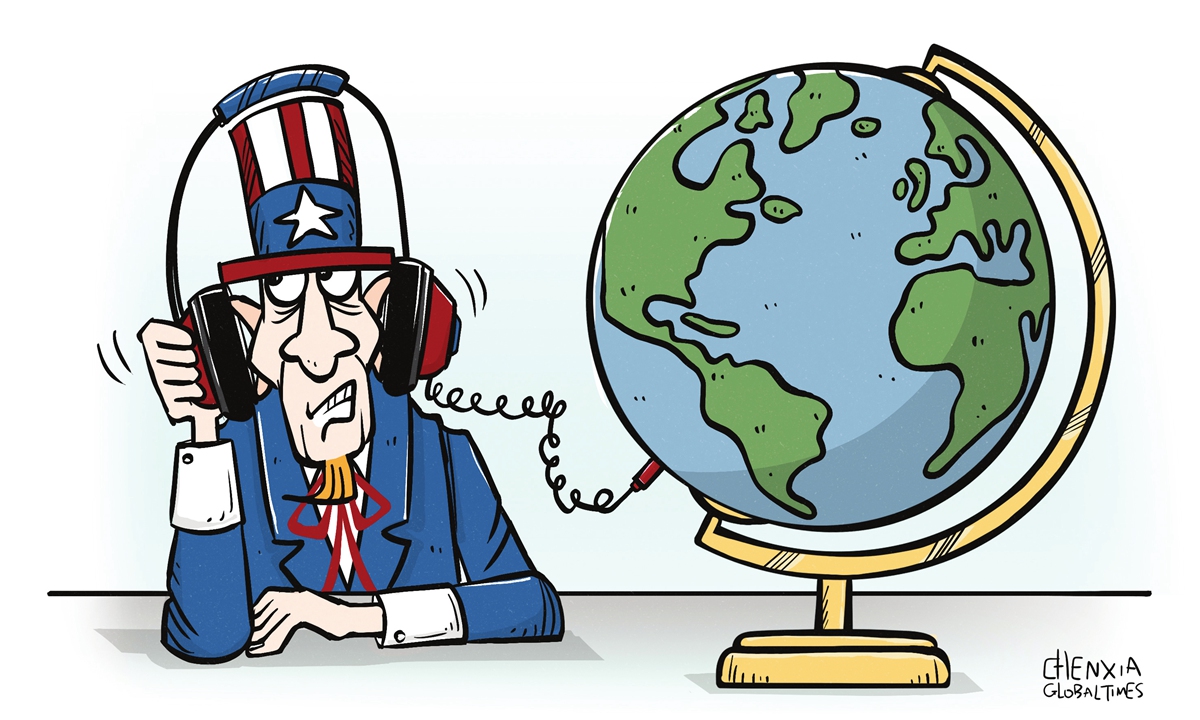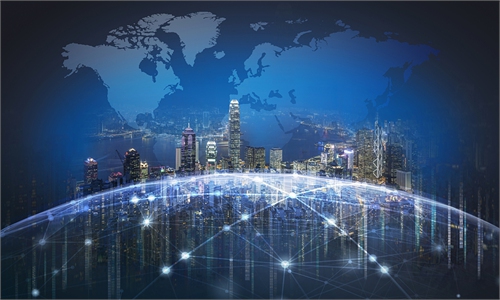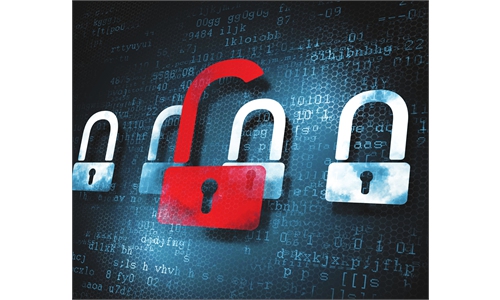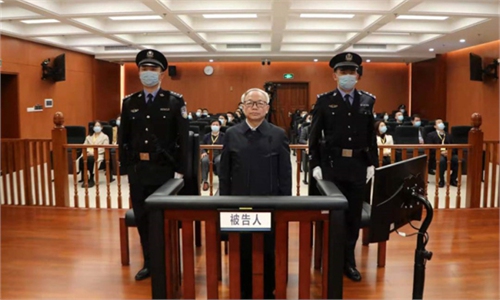
Illustration: Chen Xia/Global Times
The pursuit of peace, security and development is common desire of humanity. Unfortunately, it must be acknowledged that the global cyberspace still faces severe challenges and threats. This is mainly because of the irresponsible rogue hegemon, the US. On the one hand, the US continues to abuse its technological advantages to implement unrestricted, uncontrolled and boundaryless comprehensive surveillance worldwide. On the other, it hypocritically talks about the so-called rules-based liberal international order, distorts facts, and attempts to divide the global cyberspace in the name of constructing a new order based on shared values. It poisons and even blocks constructive pragmatic cooperation, dragging the global cyberspace back to the era of digital jungles monopolized by hegemonic power and its cliques.US' comprehensive surveillance
Objectively speaking, the vast majority of international players can understand and comprehend global cyberspace security and development with a pragmatic, rational, objective and constructive attitude. People do not expect a digital utopia to emerge immediately, but at the same time, they sincerely hope that international actors can work together toward the construction of a community with a shared future in cyberspace, making every effort to enable the achievements of the information technology revolution to benefit humanity as much as possible, and jointly exploring and striving for sustainable development models and paths, so as to make tomorrow better than today.
However, for the hegemonic power, the information technology revolution since its inception has been a tool for acquiring, strengthening and consolidating its hegemonic advantages. Based on an absolute self-centered unilateral security concept, the US has established a set of absolute security standards that come at the cost of other countries' reasonable security concerns and even core interests. The hegemonic country attempts to gain unilateral, unrestricted, and even absolute freedom of action in the global cyberspace by comprehensively using various means and methods, while unilaterally squeezing the legitimate rights of other countries, including even its loyal allies.
In terms of cyberspace practices, the most notable is the US' comprehensive surveillance, which has been evolving and developing since the Cold War to this day in the global cyberspace without boundaries, limits, or bottom lines. In a sense, the goal pursued by such US' measures is to transform global cyberspace into what Western scholar Michel Foucault called a "Panopticon prison," where specific departments and individuals of the hegemonic power become the "wardens and guards" in this digital Panopticon prison, who can freely use nearly absolute power to monitor any behavior entities they want to spy on, and no one can escape.
The US' actions are considered as digital rogue ones without boundaries, bottom lines, or limits, as there are ample examples showing that the monitoring actions conducted by the US in the global cyberspace far exceed the normal requirements for national security. In some cases, they have reached an alarming level.
Disregarding diplomatic etiquette and allies' dignity, the US blatantly monitored the heads of state, leaders of its allies and international organizations, and showed no remorse.
Countries such as Germany, France, Italy, Japan, and Israel are crucial political, military and economic allies that the US often boasts about. However, confidential documents disclosed by WikiLeaks showed that even loyal allies cannot escape US surveillance. 125 phone numbers, including those of German political figures such as former chancellor Angela Merkel, were all under the surveillance of the National Security Agency (NSA) for decades. In a surveillance operation implemented in October 2011, a meeting between Merkel and then French president Nicolas Sarkozy with the ex-Italian prime minister Silvio Berlusconi was listened in. The NSA also tapped a 2010 conversation between Israeli Prime Minister Benjamin Netanyahu and Berlusconi during which they discussed US-Israel relations and a 2008 meeting between then UN secretary general Ban Ki-moon and German chancellor Angela Merkel on climate change.
What is more astonishing is that every time such news is disclosed, the response of American politicians, even the mainstream media, is that "it proves that American intelligence agencies are doing what they are supposed to do." Observers point out that the surveillance reflects the US' habitual "desire for control" and "arrogance to do whatever they want," as well as an unspoken but difficult to conceal "profound distrust of allies."
The US shamelessly applies double standards, making the monitoring of commercial confidential communication a necessary component of so-called "fair trade," without any sense of business ethics. During the Cold War, the US and its "Five Eyes" partners set up a global surveillance system known as "ECHELON." The initial purpose of this system was to serve the signal intelligence collection needs against countries in the Eastern Bloc during the Cold War. However, reports also revealed that the US used it for corporate and industrial espionage as well, gathering sensitive information on European corporations, then turning it over to American competitors so they can gain an economic advantage.
It is noteworthy that the US has formed a set of distorted criteria in this process. In the eyes of Washington, monitoring must be maintained to ensure the victory of US companies, and this is not an abuse, but part of normal business competition. However, if US companies lose the competition, those who win must have received "support from national intelligence" and "stolen US trade secrets." This set of criteria has repeatedly been applied to Washington's unreasonable attacks against the Chinese government and brutal suppression against Chinese companies since 2015.
Cyber bully
The US monitors ordinary netizens without restraints, intruding upon and collecting a massive amount of personal information with no intelligence value.
Human rights and privacy protection are often mentioned by the US government as a justification and value basis for its arbitrary attacks on other countries and governments. However, after Edward Snowden revealed in 2013 that the NSA uses the PRISM program to conduct global surveillance, even mainstream Western media outlets such as The Washington Post have had to admit awkwardly that 90 percent of those being monitored by the NSA were ordinary internet users, rather than those who posed a threat to US national security.
According to The Washington Post, after reviewing messages and documents, it was found that most of them were "useless by the analysts but nonetheless retained, have a startlingly intimate, even voyeuristic quality." Neither then president Barack Obama nor his successors such as Donald Trump and Joe Biden used the high standards and strict requirements that the US usually always uses in dealing with other countries' human rights situations to make effective adjustments and changes. Instead, they either resorted to sophistry, rigidly denied, or pretended not to know what happened or as if nothing happened. They then muddled it through without any repentance.
At the cost of directly undermining the trust foundation of commercial activities, the US engages in extremely rare supply chain pollution actions.
On February 11, 2020, The Washington Post published an in-depth investigative report titled "The intelligence coup of the century," revealing that for more than 50 years, the Central Intelligence Agency (CIA) and West German intelligence service added backdoors into encryption products of a Swiss encryption equipment manufacturer named Crypto AG and used these for intelligence gathering purposes. More than 100 governments around the world, possibly as many as 120, including US allies, purchased and employed the backdoored equipment. These customers had no vigilance or preventive measures against the devices sold by the US, and did not expect that the US would not only have targeted its allies but also dared to adopt supply chain pollution actions that would have a negative impact on the entire industry ecology.
What is even more startling is the shameless attitude of the American elites toward such rogue behavior. On March 17, 2000, former CIA director James Woolsey wrote an article titled "Why we spy on our allies" in The Wall Street Journal. In an extreme American narcissistic logic, he pointed out that monitoring allies is a necessary precondition to ensure "fair trade" opportunities for American companies, because European companies "bribe" and are "more corrupt."
Obviously, the US has become the main troublemaker for global cyberspace security, stability, and development. Bearing the US' unrestricted, uncontrolled, and boundaryless comprehensive surveillance not only harms the interests of the victims, but also is detrimental to the long-term development of global cyberspace. As one of the main victims, US allies should demonstrate real courage to put rules-based multilateralism and international law in practice, and say "no" to the cyber bully. They should take concrete actions to counteract this negative behavior that threatens global cyberspace. Together with all responsible entities, they should take a solid step toward building a community with a shared future in cyberspace that can truly benefit all of humanity.
The author is director of the Research Center of Cyberspace Governance, Fudan University. opinion@globaltimes.com.cn



